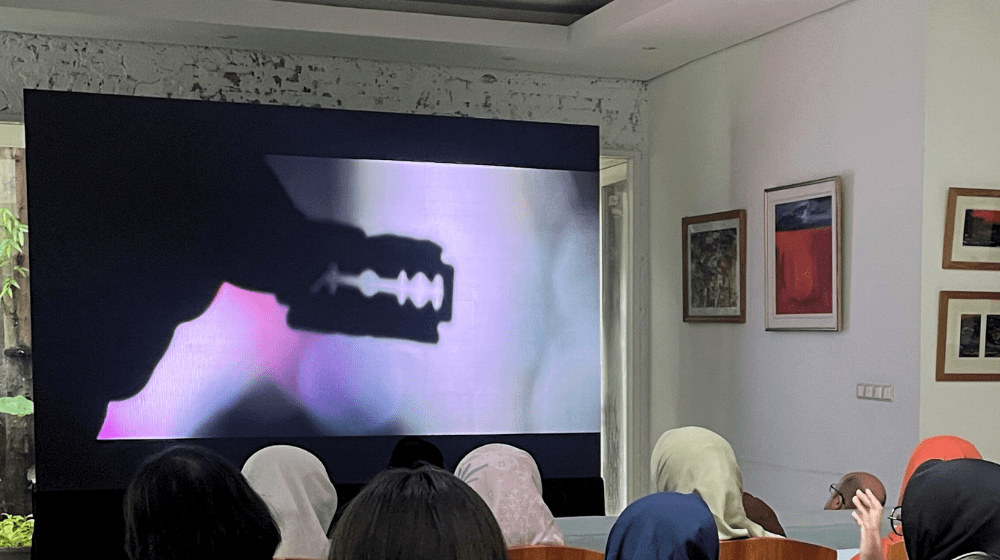Jakarta, 5 June 2024—Female genital mutilation/cutting (FGM/C) is internationally recognized as a human rights violation. Globally, more than 230 million women and girls have undergone FGM/C. To end this practice by 2030 in 31 priority countries, we need an investment of 2.75 billion USD.
The United Nations Population Fund (UNFPA), in collaboration with the Embassy of Ireland and the Embassy of Belgium, held a screening of the film “Girl from Mogadishu” about an FGM/C survivor from Somalia, and policy dialogue on 5 June 2024 in Jakarta with speakers from the Ministry of Women’s Empowerment and Child Protection (KemenPPPA), the Ministry of Health (Kemenkes), Indonesian Women Ulema Congress (KUPI), and Universitas Sali Al-Aitaam (UNISAL) Bandung.
In Indonesia, 21,3% of FGM/C conducted were acts of injuring cutting the clitoris (type 1 of FGM/C according to WHO), 21,1% were symbolic genital mutilation practices, while 12,6% were those with details unknown by the women and girls who underwent it, according the 2021 Indonesian National Women’s Life Experience Survey (SPHPN 2021). With the leadership of the KemenPPPA, along with Kemenkes, Indonesian Midwives Association (IBI), and Indonesian Women Ulema Congress (KUPI), there is hope for the end of FGM/C in Indonesia.
“The Government of Indonesia has a roadmap and action plan for FGM/C prevention 2020-2030 that covers public awareness, policy advocacy, and multisectoral engagement. It’s also integrated into the National Medium-Term Development Plan (RPJMN) 2024-2029,” Ministry of Women’s Empowerment and Child Protection Assistant Deputy for Women’s Rights Protection in Vulnerable and Household Settings, Eni Widiyanti, S.E., MPP., M.S.E, elaborated.
Health sector response is critical in eliminating FGM/C. Ministry of Health’s Director of Productive Age and Senior Health, dr. Nida Rohmawati, MPH, emphasized that FGM/C offers no health benefits, yet causes immediate and long-term health consequences, ranging from pain, bleeding, infection, sexual dysfunctional disorders, to psychological trauma that last a lifetime.
“We must ensure that health workers do not perform this practice and it’s not seen as a medical procedure.”
“I would like to commend the Government of Indonesia for being very upfront about the issue of FGM/C in Indonesia. The only country in this region that has produced data on FGM/C is Indonesia so it shows the seriousness to address the issue,” UNFPA Indonesia Representative, Hassan Mohtashami, affirmed. “Globally, FGM/C is an unacceptable practice. UNFPA and UNICEF as the lead UN agencies on the issue are trying our best, through collaboration with government partners, to address it at the root causes.”
Beyond laws and regulations, we need to change social norms, including gender norms. We can do this using holistic and multi-sectoral approaches that engage households, community and religious leaders, institutions, and policymakers, as change must come from within and led by the community.
KUPI’s religious view and stance (fatwa) that firmly states that FGM/C without medical reason is forbidden (haram) issued in 2022 was an important milestone in the advocacy for ending FGM/C in Indonesia. “It’s also important for us to work with the Indonesian Ulema Council (MUI) because their fatwa is considered as a stronger religious decision compared to that of Muhammadiyah and Nadhlatul Ulama,” said Chair of KUPI’s Deliberation Council, KH. Hussein Mohammad.
Nurasiah Jamil, a midwifery lecturer at Universitas Sali Al Aitam in Bandung, who is a survivor of FGM/C, has been a strong advocate in her community. “I included gender-based violence and FGM/C in my midwifery course… My hope is that no midwife will perform FGM/C anymore.”
Ultimately, it takes not only a village but the entire world to protect women and girls from FGM/C and other harmful practices. Stronger commitment across sectors, as well as support from international development partners, is required to accelerate progress.
“Female genital mutilation is a clear violation of the human rights of women and girls. Ireland strongly supports efforts to end this terrible practice,” H.E. Pádraig Francis, Ambassador of Ireland to Indonesia, remarked.
“To eliminate the harmful practice of FGM/C, a multistakeholder approach is indispensable. Belgium will continue to support global efforts to this end,” H. E. Frank Felix, Ambassador of Belgium to Indonesia, said.
For more information, please contact:
Rahmi Dian Agustino (UNFPA Indonesia): agustino@unfpa.org
Odhrán McMahon (Embassy of Ireland): Odhran.McMahon@dfa.ie
Sarah Gerard (Embassy of Belgium): jakarta@diplobel.fed.be


